- Home
- John Scalzi
Tales From the Clarke thd-5 Page 2
Tales From the Clarke thd-5 Read online
Page 2
“You can’t replace the conduits because the replacement conduits don’t exist,” Coloma said.
“Right,” Basquez said.
“Power conduits are still being made,” Coloma said. “We had them all over the Clarke.”
“Right, but they’re not rated for this sort of power output,” Basquez said. “Trying to use the current standard conduit here would be like stuffing a Great Dane into a Chihuahua sweater.”
Coloma had to stop for a moment to take in the visual Basquez just offered. Then she said, “Would these conduits last through our mission? We’re only skipping to the Rus system and back.”
“There’s two ways of answering that,” Basquez said. “The first one is to say that these conduits probably won’t overload and rupture, or destroy this section of the ship, or rupture the hull, or kill everyone on board, including those important Earth visitors. The second one is that if you decide not to replace them, I hope you don’t mind if I do my work remotely, like from Phoenix Station.”
“What do you suggest?” Coloma asked.
“How much time do we have before we have to be under way?” Basquez asked.
“Twelve days,” Coloma said.
“We have two options,” Basquez said. “We comb through CDF and civilian shipyards looking for this size of conduit and hope they’re not as degraded as these are, or we commission some made from scratch from the shipyards, based on this specification, and hope they arrive in time.”
“Do both,” Coloma said.
“Belt and suspenders, very wise,” said Basquez. “This is the part where you send a note to that Rigney guy telling him to yell at people to get those parts here on time, right? I want a couple of days with them to make sure they have the capacity we’ll need.”
“I’ll do it on my way to my next meeting,” Coloma said.
“This is why I like working with you, Captain,” Basquez said, and then turned his attention to one of his engineers, who evidently needed yelling at.
Rigney promised to get the conduit specialists at the CDF shipyards on Phoenix Station on the job and told Coloma to have Basquez send the specs to him directly. Coloma smiled as she disconnected from her talk with Rigney. Civilian captains and ships were almost always prioritized below Colonial Defense Forces ships when it came time to allot materials and expertise; it was nice to be at the front of the line for once.
Coloma’s next meeting, in one of the ship’s tiny conference rooms, was with Lieutenant Harry Wilson.
“Captain,” Wilson said as she approached him. He saluted.
“Why do you do that?” Coloma asked him. She sat down at the conference room table.
“Ma’am?” Wilson said, lowering his arm.
“Why do you salute me?” Coloma asked. “You’re Colonial Defense Forces and I am not. You’re not required to salute civilian captains.”
“You still outrank me,” Wilson said.
“That’s not what you told me at Danavar, when you flashed your security clearance at me and ordered me to give you my shuttle,” Coloma said. “Which you then destroyed.”
“Sorry about that, ma’am,” Wilson said. “It was necessary at the time.”
“You still have that security clearance?” Coloma asked.
“I do,” Wilson said. “I think they forgot they gave it to me. I’m pretty harmless with it. I use it mostly to check box scores for baseball games back on Earth.”
“I understand you’ve just returned from being a hostage,” Coloma said.
“Yes, ma’am,” Wilson said. “An unfortunate incident with the Bula. We ended up with six of their ships planning to blow us out of the sky. Ambassador Abumwe was part of the diplomatic team that got us released. They’re still ironing out the details of the ransom, I believe. Letting us go early was a sign of good faith. They have other things to hold over us.”
“You certainly find yourself in the middle of a number of interesting incidents,” Coloma said.
“I wouldn’t mind not having that talent,” Wilson said.
“I have a job for you,” Coloma said. “I’m prepping this ship to display and then sell to a group of representatives from Earth. I need someone to be their guide and liaison while they are here on the ship. I want you to do it.”
“Seems to me you have an entire diplomatic corps you can call on to do that job,” Wilson said. “I’m a CDF tech specialist.”
“You’re from Earth,” Coloma said. “All the diplomats I could use are from the Colonial Union. My job is to make these people comfortable with the ship and with us. I think it would be useful to have someone here who speaks their language.”
“I might not speak their language,” Wilson said. “There are a couple hundred of them in service on Earth.”
“It’s an expression,” Coloma said, testily, and pulled out her PDA. “I meant someone who has a shared history with them and who can cogently describe the advantages of the Colonial Union to them. Your technical background will come in handy because that means you can explain details of the ship to them, which no normal diplomat could do. Also, the files I have on these representatives says that they are all from either the United States or Canada. I think you will be able to speak their language just fine.” She played her fingers across the PDA. “There. I’ve sent you their information.”
“Thank you,” Wilson said. “If you want me, I’m happy to serve in this role for you. I’m just surprised you want me. I was pretty sure I was on your shit list, Captain.”
“You were,” Coloma said. “You are. But help me with this and you’ll get off of it.”
“Yes, ma’am,” Wilson said.
“Good. Then we’re done here,” Coloma said. “You’re dismissed.”
“Of course,” Wilson said, and then saluted Coloma again.
“I already told you that wasn’t necessary,” Coloma said to Wilson.
“You put your ship in the path of a missile meant to kill members of an alien race, and kept the Colonial Union from having to fight a fight we’d have lost,” Wilson said. “That deserves a salute, ma’am.”
Coloma returned the salute. Wilson left.
Basquez got his conduits a day before departure and was not in the least happy about it. “We’ve barely got time to install them, much less test them,” Basquez said, through the PDA. “And I haven’t had time to update the engineering systems down here. We’re still working off of fifty-year-old stations. You need to ask your Rigney for a delay.”
“I already did and he already said no,” Coloma said. She was in the shuttle bay’s control room with Balla and Wilson, waiting for the arrival of the Earth diplomats. “They’ve got these people on a tight schedule.”
“His precious schedule will be disrupted if we blow the hell up,” Basquez said.
“Is that really going to be a problem?” Coloma said.
There was a pause on the other end of the PDA. “No,” Basquez admitted. “I did a preliminary test of their throughput when I unpacked them. They should hold up.”
“It will take us three days to get to skip distance,” Coloma said. “That should be more than enough time to do your tests.”
“It would be better to do the tests here in the dock,” Basquez said.
“I’m not disagreeing with you, Marcos,” Coloma said. “But it’s not up to us.”
“Right,” Basquez said. “I’ll have these bastards installed in about six hours, and I’ll run a few more tests off the engineering stations. If I can, I’ll update the stations with new software tomorrow. It might give us more accurate readings.”
“Fine,” Coloma said. “Let me know.” She ended the discussion.
“Problems?” Balla asked her.
“Other than Basquez being paranoid, no,” Coloma said.
“It’s not a bad thing for an engineer to be paranoid,” Balla said.
“I prefer them that way,” Coloma said. “Just not when I’m busy with other things.”
“The shuttle is twenty kl
icks out and slowing,” Wilson said. “I’m going to purge atmosphere and open the doors.”
“Do it,” Coloma said. Wilson nodded and communicated directly with the shuttle bay systems with the BrainPal computer in his head. There was a chugging sound as the bay reclaimers sucked in the air and stored it for rerelease. When the bay was sufficiently airless, Wilson cracked up the bay doors. The shuttle hovered silently outside.
“Here come the Earthlings,” Wilson said.
The shuttle landed. Wilson closed the doors and reintroduced the atmosphere; when it was back, the three of them filed out to wait for the shuttle door to open and disgorge its passengers.
To Coloma’s eye they did not seem especially impressive: three men and two women, all middle-aged and homogeneous in appearance and attitude. She introduced herself, Balla and Wilson; the leader of the Earth contingent introduced himself as Marlon Tiege and likewise announced his team, fumbling over the names of two of them. “Sorry,” he said. “We’ve had a long journey.”
“Of course,” Coloma said. “Lieutenant Wilson will be your liaison while you are here; he’ll be more than happy to show you your quarters. We’re on standard universal time on this ship, and we’re scheduled to depart from Phoenix Station at 0530 tomorrow morning; until then, please rest and relax. If you need anything, Wilson will make it happen.”
“I am at your service,” Wilson said, and then smiled. “My files tell me you’re from Chicago, Mr. Tiege.”
“That’s right,” Tiege said.
“Cubs or White Sox?” Wilson asked.
“You have to ask?” Tiege said. “Cubs.”
“Then I feel honor-bound to inform you I’m a Cards fan,” Wilson said. “I hope that won’t cause a diplomatic incident.”
Tiege smiled. “I think in this one case I’ll be willing to let it pass.”
“We’re talking baseball,” Wilson said to Coloma, noting her look, which was positioned between puzzlement and irritation. “It’s a popular team sport in the United States. His favorite team and my favorite team are in the same division, which means they are rivals and frequently play against each other.”
“Ah,” Coloma said.
“They don’t have baseball up here?” Tiege asked Wilson.
“Mostly not,” Wilson said. “Colonists are from different parts of the world. The closest most colonies come is cricket.”
“That’s crazy talk,” Tiege said.
“Tell me about it,” Wilson said, and then motioned with his hand, leading the Earth mission from the shuttle bay while Tiege nattered on about the Cubs.
“What just happened?” Coloma asked Balla, after a minute.
“You said you wanted someone who would speak their language,” Balla reminded her.
“I expected to be able to speak their language a little,” Coloma said.
“Better learn more about baby bears,” suggested Balla.
The first day of the trip consisted of Wilson giving the visitors a tour of the ship. Coloma wasn’t thrilled when the contingent from Earth showed up on her bridge, but the entire point of the trip was to sell them on the ship, so she did her best impression of a polite, engaged captain who had nothing better to do than answer inane questions about her ship. While she was doing this, she would occasionally glance over at Wilson, who seemed preoccupied.
“What is it?” Coloma asked him, when Balla had led the Earth contingent over to the life support and energy management displays.
“What is what?” Wilson said.
“Something is bothering you,” Coloma said.
“It’s nothing,” Wilson said. Then, “I’ll tell you about it later, ma’am.”
Coloma considered pressing him on the subject, but then Tiege and his cohort returned to Wilson, who took them elsewhere. Coloma made a note to follow up with Wilson and then got lost in the day-to-day management of the ship.
It was as Rigney had advertised to her: old but serviceable. Its systems ran well, with the occasional bump occasioned by the fact that she and every other crew member had to learn archaic systems. Some of the systems, like those in the engine room, had never been updated because the systems they were tied to had never been updated, either. Other systems were revamped when the ship made the transition from military to civilian use, and others-like the weapons systems-were removed almost entirely. Regardless, none of the systems were newer than fifteen years old, a period of time two years longer than Coloma herself had been in the Department of State’s fleet service. Fortunately, neither the CDF nor the Department of State was the sort of organization to radically change the interface of its command systems. Even engineering’s fifty-year-old consoles were simple enough to navigate through once you made a few concessions to antiquity.
It’s not a bad ship, Coloma said to herself. The people of Earth weren’t getting something new, but they weren’t getting a lemon, either. She’d hesitate to go so far as to call it a classic, however.
Sometime later, Coloma’s PDA pinged; it was Basquez. “I think we may have a problem,” he said.
“What kind of problem?” Coloma asked.
“The sort where I think you might want to come down and have me explain it to you in person,” Basquez said.
“I tried updating the engineering software on the consoles, but that didn’t work because the consoles are fifty years old and the hardware can’t keep up with the new software,” Basquez said, handing his PDA to Coloma. “So I went in the opposite direction. I took the software from the consoles, ported it into my PDA and created a virtual environment to run it. Then I updated it inside that environment to boost its sensitivity. And that’s where I saw this.” He pointed to a section of the PDA, which was displaying a picture of what looked like a glowing tube.
Coloma squinted. “Saw what?” asked. “What am I looking at?”
“You’re looking at the energy flow through a section of the conduit we just installed,” Basquez said. “And this”-he pointed again at a section of the PDA, tapping it for emphasis-“is a kink in the flow.”
“What does that mean?” Coloma said.
“Right now it doesn’t mean anything,” Basquez said. “We’re only passing ten percent of capacity through the conduit to prep and test the skip drive. It’s a disruption of maybe one ten-thousandth of the total flow. Small enough that if I hadn’t updated the software, I would have missed it. The thing is, there’s a reason we keep power flows as smooth as possible-disruptions introduce chaos, and chaos can mean ruptures. If we push more capacity through the conduit, there’s no guarantee that the disruption won’t scale at a geometric or logarithmic rate, and then-”
“And then we would have a rupture and then we’d be screwed,” Coloma said.
“It’s a very small risk, but you’re the one the Colonial Union is telling to make this thing go off without a hitch,” Basquez said. “So this is a hitch. A potential hitch.”
“What do you want to do about it?” Coloma said.
“I want to take down that chunk of tube and run some scanners through it,” Basquez said. “Find out what’s causing the problem. If it’s an imperfection in the physical conduit or the sheathing inside, that’s something we can fix here. If it’s something else…well, I have no clue what else it could be except a physical imperfection, but if it’s something else, we should figure out what it is and what we can do about it.”
“Does this set us back on our itinerary?” Coloma asked.
“It might, but it shouldn’t,” Basquez said. “I’m about 99.99 percent sure it’s something we can deal with here. My people will need about ninety minutes to take down that section, another sixty to scan it the way it should be scanned, about ten minutes to buff out any imperfections we find, and another ninety minutes to reinstall the section and run some tests. If everything checks out, we can push more power through on schedule. You won’t miss your skip.”
“Then stop talking to me about it and do it,” Coloma said.
“Yes, ma’am,” B
asquez said. “I’ll let you know when everything’s cleaned up.”
“Good,” Coloma said. She turned away from Basquez and saw Wilson walking up to her. “You’ve lost your flock,” she said to him.
“I didn’t lose them, I parked them in the officers lounge to watch a video,” he said. “Then I went to the bridge to find you, and Balla said you were here.”
“What is it?” Coloma said.
“It’s our Earthlings,” Wilson said. “I’m pretty sure they’re not actually from Earth. Not recently, anyway.”
“You’re basing your suspicions on a baseball team?” Neva Balla asked, disbelievingly. Coloma had her report to the conference room she and Wilson were in and had Wilson repeat what he had said to her.
“It’s not just any baseball team, it’s the Cubs,” Wilson said, and then held out his hands in a helpless sort of gesture. “Listen, you have to understand something. In all of the history of professional sports, the Cubs are the ultimate symbol of complete failure. The championship of baseball is something called the World Series, and it’s been so long since the Cubs have won it that no one who is alive could remember the last time they won it. It’s so long that no one alive knew anyone who was alive when they won it. We’re talking centuries of abject failure here.”
“So what?” Balla said.
“So the Cubs won the World Series two years ago,” Wilson said. He nodded to Coloma. “I made a joke to Captain Coloma here that I’ve been using that security clearance I have to check baseball box scores. Well, it’s not a lie, I do. I like having that connection back home. Yesterday when Tiege mentioned being a Cubs fan, I sent in a request for the Cubs’ season stats going back to when I left Earth. As a Cards fan, I wanted to rub his face in his team’s continued failure. But then I found out the Cubs had broken their streak.”
Balla looked at Wilson blankly.
“Two years ago the Cubs won a hundred and one games,” Wilson continued. “That’s the most games they’ve won in over a century. They only lost a single game in their entire playoff run, and swept the Cards-my team-in their divisional series. In game four of the World Series, some kid named Jorge Alamazar pitched the first perfect game in a World Series since the twentieth century.”

 Lock In
Lock In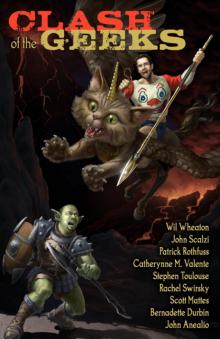 Clash of the Geeks
Clash of the Geeks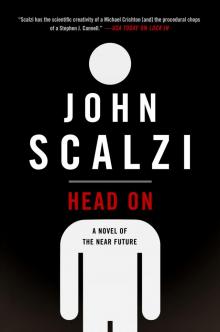 Head On
Head On The Dog King
The Dog King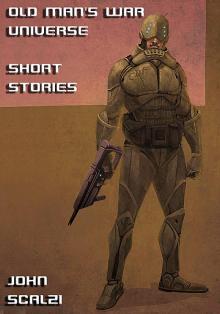 Old Man's War Universe: Short Stories
Old Man's War Universe: Short Stories The End of All Things
The End of All Things Tales From the Clarke
Tales From the Clarke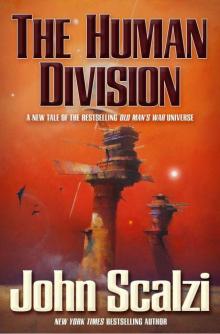 The Human Division
The Human Division The Android's Dream
The Android's Dream An Election
An Election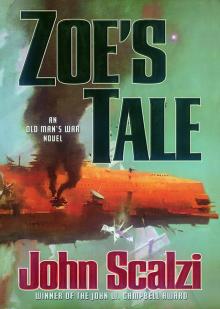 Zoe's Tale
Zoe's Tale Agent to the Stars
Agent to the Stars This Hollow Union
This Hollow Union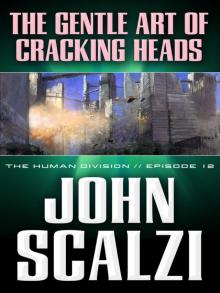 The Gentle Art of Cracking Heads
The Gentle Art of Cracking Heads Old Man's War
Old Man's War The Tale of the Wicked
The Tale of the Wicked Your Hate Mail Will Be Graded: A Decade of Whatever, 1998-2008
Your Hate Mail Will Be Graded: A Decade of Whatever, 1998-2008 Judge Sn Goes Golfing
Judge Sn Goes Golfing The Back Channel
The Back Channel The Human Division 0.5 - After the Coup
The Human Division 0.5 - After the Coup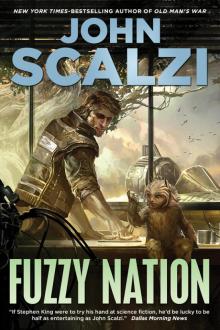 Fuzzy Nation
Fuzzy Nation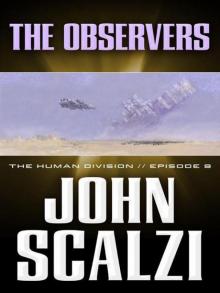 The Observers
The Observers This Must Be the Place
This Must Be the Place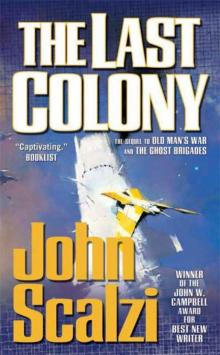 The Last Colony
The Last Colony Unlocked: An Oral History of Haden's Syndrome
Unlocked: An Oral History of Haden's Syndrome A Voice in the Wilderness
A Voice in the Wilderness Redshirts
Redshirts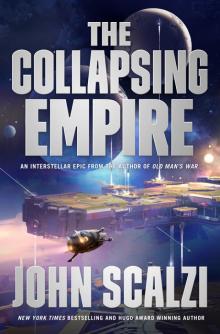 The Collapsing Empire
The Collapsing Empire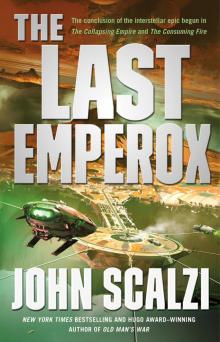 The Last Emperox
The Last Emperox The God Engines
The God Engines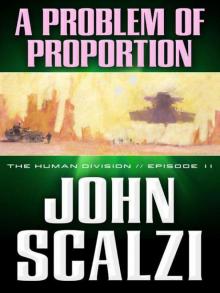 A Problem of Proportion
A Problem of Proportion THAT WAS THE MILLENIUM THAT WAS
THAT WAS THE MILLENIUM THAT WAS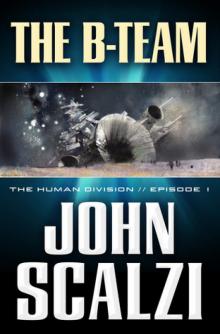 The B-Team
The B-Team The Sound of Rebellion
The Sound of Rebellion The President's Brain Is Missing
The President's Brain Is Missing Questions for a Soldier
Questions for a Soldier Walk the Plank
Walk the Plank We Only Need the Heads
We Only Need the Heads How I Proposed to My Wife: An Alien Sex Story
How I Proposed to My Wife: An Alien Sex Story Earth Below, Sky Above
Earth Below, Sky Above Everything but the Squeal
Everything but the Squeal Old Man’s War
Old Man’s War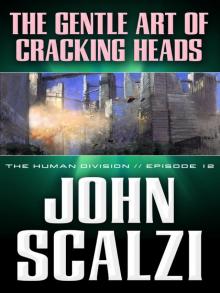 The Human Division #12: The Gentle Art of Cracking Heads
The Human Division #12: The Gentle Art of Cracking Heads This Must Be the Place thd-10
This Must Be the Place thd-10 A Voice in the Wilderness thd-4
A Voice in the Wilderness thd-4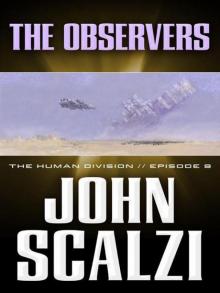 The Observers thd-9
The Observers thd-9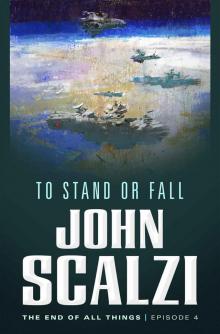 The End of All Things: The Fourth Instalment
The End of All Things: The Fourth Instalment Earth Below, Sky Above thd-13
Earth Below, Sky Above thd-13 Zoe`s Tale вбиос-4
Zoe`s Tale вбиос-4 After the Coup
After the Coup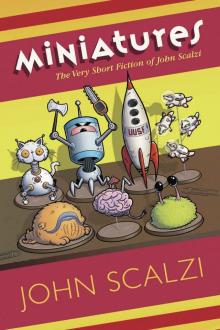 Miniatures: The Very Short Fiction of John Scalzi
Miniatures: The Very Short Fiction of John Scalzi The Last Colony вбиос-3
The Last Colony вбиос-3 Tales From the Clarke thd-5
Tales From the Clarke thd-5 Old Man's War omw-1
Old Man's War omw-1 The Human Division #8: The Sound of Rebellion
The Human Division #8: The Sound of Rebellion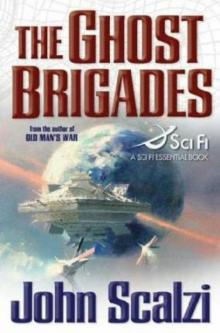 The Ghost Brigades omw-2
The Ghost Brigades omw-2 The Sagan Diary (old man's war)
The Sagan Diary (old man's war) The Sound of Rebellion thd-8
The Sound of Rebellion thd-8 The Human Division 13 - Earth Below, Sky Above
The Human Division 13 - Earth Below, Sky Above Head On_A Novel of the Near Future
Head On_A Novel of the Near Future The End of All Things: The First Instalment
The End of All Things: The First Instalment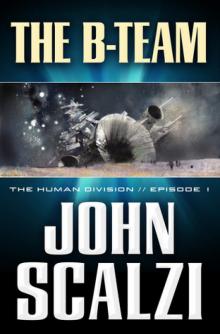 The B-Team thd-1
The B-Team thd-1 The Back Channel thd-6
The Back Channel thd-6 Walk the Plank thd-2
Walk the Plank thd-2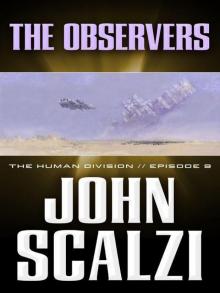 The Human Division #9: The Observers
The Human Division #9: The Observers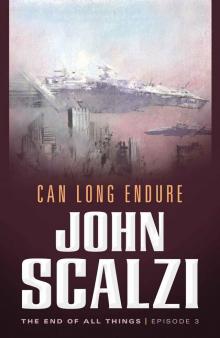 The End of All Things: The Third Instalment
The End of All Things: The Third Instalment The Human Division #10: This Must Be the Place
The Human Division #10: This Must Be the Place The End of All Things #2: This Hollow Union
The End of All Things #2: This Hollow Union We Only Need the Heads thd-3
We Only Need the Heads thd-3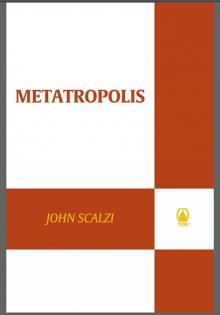 Metatropolis
Metatropolis The Dog King thd-7
The Dog King thd-7 The Consuming Fire (The Interdependency)
The Consuming Fire (The Interdependency)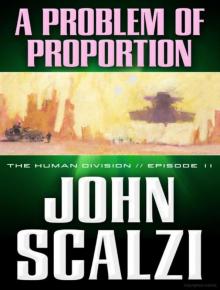 The Human Division #11: A Problem of Proportion
The Human Division #11: A Problem of Proportion